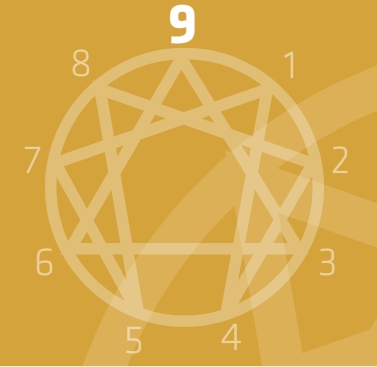Enneagram Type NINE

 The Peacemaker
The Peacemaker
Nines are easygoing, relaxed, and stable people who have an orientation towards the peaceful and the harmonious.
At their best, they are easygoing, receptive, adaptive, and flexible. They are emotionally stable, good-natured, slow to anger, relaxed, and diplomatic. Although not very demonstrative or expressive emotionally, they are kind, warm, supportive, and likable.
They have a quiet, stable nature and have a strong need for harmony in both their internal life and their relationships. Although they look serene and stable and are usually modest and keep a low profile, they are very active and dynamic, achieving the goals they set for themselves in a gentle, non-anxious style. They are present and fully engaged in their lives. They are nice to people, but know how to keep their boundaries and respect their own priorities, desires, and needs.
They are masters of mediation and conflict resolution: they possess the necessary skills for making all parties in a conflict feel heard and their perspective understood. They are good listeners and accept people as they are. They are able to understand different perspectives simultaneously. They are firm yet relaxed and diplomatic, treating others respectfully. They are good communicators and know how to tactfully guide the parties in a conflict without making them defensive. They are highly creative, and when a full resolution is not possible, they know how to bring the parties to “agree to disagree,” whereby all parties tolerate but don't accept the opposing position, but at least remain on amicable terms while continuing to disagree (or recognize that further conflict is unnecessary, ineffective, or undesirable).
They have a spiritual quality that gives them a sense of being one with life. From this quality many characteristics emerge.
First, they have a faith in life and the Universe, and that everything that happens is for the good of the person. They also believe that “when you want something, all the Universe conspires in helping you to achieve it.”
Second, they are patient and have endurance under difficult circumstances, persevering in the face of delay or provocation without acting in a negative way. They exhibit forbearance when under strain, especially when faced with long-term difficulties. Their patience also allows them to function effectively during crises, acting without agitation or disturbance and bringing calm to an anxious environment.
Third, they have equanimity, a deep awareness and acceptance of the present moment, that allows them to appreciate the simplest things in life.
Fourth, they empower others by simply accepting and encouraging them to develop themselves and giving them freedom to choose their growth path.
Although they are spiritual people, they remain deeply grounded, and realistic, and they can take quick action based on their instincts.
In the Stuckness Zone, they begin to have a strong desire to maintain an internal and external sense of peace (sometimes at any cost). Their focus of attention shifts more exclusively to things that can alter their sense of quiet.
To maintain their external sense of peace, they focus automatically on how to avoid conflict and tension. They begin to accommodate their own agenda to other people's requests and demands, merging themselves and sometimes almost disappearing in the process. They may say “yes” just to please other people, when they really mean “no.” They don't take strong positions because they prefer not to upset others. Although they may look outwardly nice, they may begin acting passive-aggressively, becoming stubborn and internally refusing to act.
To maintain their internal sense of peace, they try to maintain their life as free from changes as possible, and as comfortable as possible. They want to hold to routines and not be moved from them. They can become passive and unpretentious. Their healthy modesty degenerates into an “I don't count” mentality. They perceive themselves as not important, as if their participation in the world doesn't count. They forget themselves and become invisible while acquiring other people's agendas.
In order to maintain peace they try to dissociate from anything disturbing, including their own emotions, thoughts, and experiences. Since reality and life usually present us with daily annoyances and disturbances, they may begin to numb themselves in order to avoid them. Many fall into distracting and anesthetizing habits like overeating, watching TV, or spending hours at the computer with no clear purpose. It's like escaping into sleep. They lose track of time and begin living with low self-awareness.
This automatic focus on keeping internal/external peace usually leaves them confused and with low energy, with difficulties in taking action in the important areas of their lives. Since nothing seems either really important or urgent to them, they give everything the same importance, losing the ability to prioritize or make decisions effectively. Inessentials and small comforts replace real priorities. Problems may accumulate and they may become indifferent to them, and a “problems-will-take-care-of-themselves” mentality sets in.
Type description, from "From Stuckness to Growth: Enneagram Coaching" (2012) by Yechezkel & Ruth Madanes
Type 1 Type 2 Type 3 Type 4 Type 5 Type 6 Type 7 Type 8
